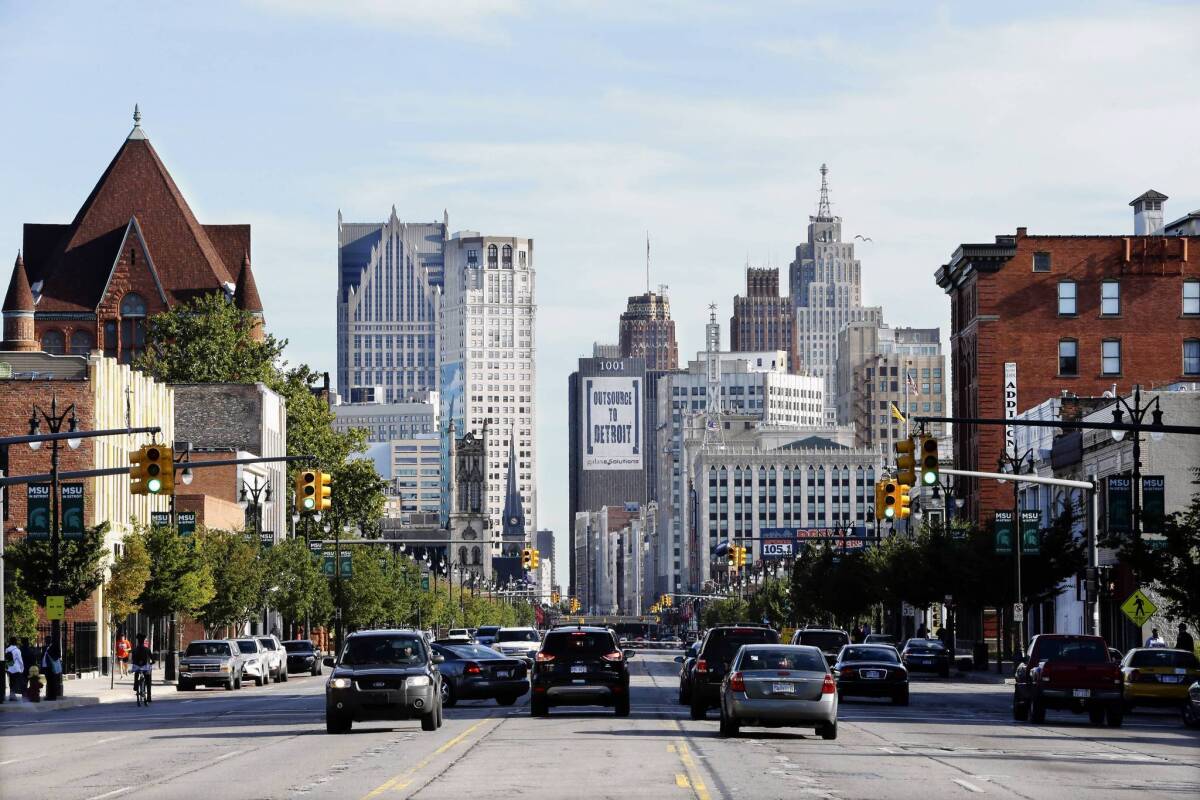Digging into Detroit’s bankruptcy filing

- Share via
Detroit has once again been in the headlines as the city and its creditors battle in court over whether the city is eligible to receive bankruptcy protection.
Municipal bankruptcy, like just about everything else that contains the word “municipal” or has anything to do with lawyers, is complicated. We checked in with Detroit lawyer Nathan Resnick, a municipal bankruptcy expert, and with his help we’ll try to explain what an ongoing court hearing means, and where Detroit stands in its efforts to turn around its finances.
Didn’t Detroit already file for bankruptcy? What’s the purpose of the hearing?
Detroit did file for bankruptcy protection on July 18, a process that automatically protects the city against any impending action from creditors. But that doesn’t mean it definitely gets to remain in bankruptcy.
Judge Steven Rhodes is hearing arguments about whether the city was, in fact, insolvent when it filed for bankruptcy, and whether it negotiated in good faith with its creditors.
Detroit seems pretty broke — $18 billion in debt. Why would anyone argue it shouldn’t be able to file for bankruptcy?
Creditors, which include public employee unions and pension funds, say that the city did not try to negotiate with them before filing for bankruptcy.
They say that Michigan Gov. Rick Snyder appointed an emergency manager, Kevyn Orr, to take over city governance with the idea that Orr would force the city into bankruptcy rather than figure out a way to pay creditors. They’ve been asking the judge to look into who else [the Republican governor] considered for the emergency manager position before settling on Orr, who represented Chrysler in its 2009 bankruptcy, to prove that Snyder just wanted someone who knew a lot about bankruptcy.
What is an emergency manager?
Michigan has had emergency managers for a while now, but they were given more power by a law, Public Act 4, passed by the Michigan Legislature in March of 2011, shortly after Gov. Snyder took office. Public Act 4 allowed the state’s governor to appoint an emergency manager to take over from elected officials in any municipality or school district in Michigan undergoing a “financial emergency.”
Voters repealed Public Act 4 last November, but the Legislature passed another emergency manager law, Public Act 436, in December. There are currently six cities, and three school districts in Detroit, with emergency managers, according to Stephanie Vaught, a legal analyst with Sugar Law Center in Detroit.
What happens if the judge decides Detroit is eligible for bankruptcy?
If the judge says that Detroit is eligible for bankruptcy, a whole different set of negotiating will begin. The city will submit a plan of reorganization, which then creditors will get to weigh in on. The judge will then decide on various points of the plan.
But if the judge decides that Detroit isn’t eligible for bankruptcy protection, the city will need to figure out quickly how to pay its creditors. This trial will end.
In other financially troubled cities, pensions are a big issue. What’s happening with Detroit’s pension obligations?
This has been one of the more complicated parts of the bankruptcy proceedings. The pension benefits of state retirees are protected by law under the Michigan Constitution. That’s why some retirees argued in a separate court filing that the bankruptcy filing violated the state constitution.
But Rhodes, the judge, said he will rule on that issue, which he will address at a later date. He first is looking at the factual issues — whether or not the city is eligible for bankruptcy protection. Then he’ll move on to the legal issues.
Can’t the city and its creditors just negotiate something and stop spending all this money arguing?
That’s another option. A mediator will also be meeting with the city and its creditors in two mediation sessions on Nov. 6 and Nov. 13. Many deals are cut in bankruptcy court, so it’s possible the two sides will figure out a way to move forward without making this trial go on any longer. Without mediation, though, the trial will likely continue through early next year.
This interview was edited for clarity.
More to Read
Sign up for Essential California
The most important California stories and recommendations in your inbox every morning.
You may occasionally receive promotional content from the Los Angeles Times.













